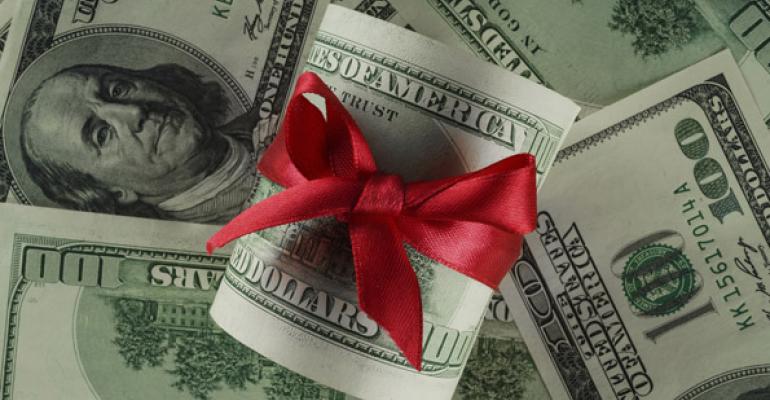Governor Cuomo has proposed a change to New York's estate and gift tax law that will require all taxable gifts made by a New York resident after March 31, 2014 to be included as part of the gross estate for purposes of calculating the New York estate tax.
Currently, there’s no gift tax in New York, and although the amount of lifetime taxable gifts made by a New Yorker may cause the estate tax rate to increase, there’s no additional estate tax due on those gifts. While not changing the gift tax, the net effect of this proposed change would be to cause New Yorkers who make taxable gifts after March 31, 2014 to pay more tax by requiring estate tax to be paid on those gifts.
In essence, when all of the New York rate adjustments are made, the new provision will cause any taxable gift made by a New York resident after March 31, 2014 to incur an additional net estate tax of anywhere from 6.5 percent to 12 percent, if the New York gross estate, including taxable gifts, exceeds the New York exclusion amount (the actual net rate is impacted by the amount of the New York exclusion amount and the federal exclusion amount). The governor's proposal also gradually increases the New York estate tax exclusion amount over the next five years from $1 million to $5.25 million, with Consumer Price Index adjustments thereafter, while lowering the top rate from 16 percent to 10 percent.
Your New York clients who have significant estates should consider making taxable gifts before April 1, 2014—especially if the individual has not used up the federal exclusion amount.
For example, a New York resident has a taxable estate valued at $15.34 million. (For this purpose, no deductions other than the deduction for state estate taxes are being considered.) If, before April 1, 2014, she makes a gift of the full federal estate tax exclusion amount ($5,340,000) and dies in 2014 after that date, her combined federal and New York estate tax would be $4,628,780. If the gift were made after March 31, 2014, her combined federal and New York estate tax would be $5,356,720—a $720,176 increase (over a 15 percent increase in the estate tax). On the other hand, if no taxable gift was made and the New York resident died before April 1, 2014, her combined federal and New York estate tax would be $5,144,720; if she died after March 31 in 2014, without making gifts, the combined federal and NY estate tax would be $5,101,360. So, the New York reduction in rate and increase in exclusion provides only a $43,360 savings. By making the gift before April 1, 2004, there’s a potential savings of $472,580. Even if she survives until the New York estate tax exclusion is in parity with the federal estate tax exclusion, which will occur in 2019, the potential savings on making a gift before April 1, 2014 would be approximately $320,000.
The increase in the combined estate tax noted above if the taxable gift is made after March 31, 2014 is caused by the fact that the tax attributable to the New York taxable gifts will more than likely not be deductible from the federal gross estate under Section 2058 of the Internal Revenue Code. That section provides that the amount of state death taxes paid "in respect of any property included in the gross estate" shall be deducted from the taxable estate. For federal purposes, taxable gifts are not included in the gross estate. While there are no cases which have been decided on this issue under IRC Section 2058 (which was added by the Economic Growth and Tax Relief Reconciliation Act of 2001), there are two cases which were decided when the Code allowed a credit for state death taxes: Second National Bank of New Haven v. United States, 442 F. 2d 40 (2d Civ. 1970); and Estate of Owen v. Commissioner, 104 T.C. 498 (1995). Both cases held that the phrase "included in the gross estate" required that the property upon which the state tax is levied must be included in the calculation of the federal gross estate. Since New York taxable gifts are not part of the federal gross estate, there will be no deduction available for the state death tax attributable. The result of this denial of deduction will be to increase the cost of making New York taxable gifts to the full amount of the estate tax attributable to the taxable gift.
There is an additional interesting aspect to the New York estate tax on taxable gifts, namely, who will be responsible for paying it. Under Section 975 of the New York Tax Law, the executor of a decedent's estate is liable for paying the tax. She must then apportion and collect the estate tax paid in accordance with the rules of Section 2-1.8 of the New York Estates, Powers and Trusts Law. That statute requires the tax to be "equitably apportioned among the persons interested in the gross tax estate (emphasis added)," unless the decedent otherwise directed. Section 975 of the Tax Law also provides that if the executor fails to pay the estate tax, the transferee shall be personally liable for the tax due.
Another issue is whether this new tax law creates the concept of a net gift, which would have the effect of lowering the value of the gift for federal gift tax purposes. The recent Tax Court decision in Steinberg v. Commissioner, 141 T.C. No 8. (September 30, 2013) may be applicable to the value of the original taxable gift, which will now be subject to New York estate tax. At the very least, the donor and donees should be advised to enter into an agreement similar to the one used in Steinberg, in order to avail themselves of the net gift valuation.





